Taxation Law Assignment: Compensation, Deductions, and Income Tax
VerifiedAdded on 2022/10/01
|7
|1348
|197
Homework Assignment
AI Summary
This taxation law assignment analyzes the tax implications of various financial transactions. The assignment addresses three key issues: whether compensation payments for loss of business income are assessable as ordinary income, whether legal expenses are deductible, and whether Christmas vouchers constitute ordinary income. The solution references relevant sections of the Income Tax Assessment Act 1997 (ITAA 1997) and case law, including Heavy Minerals Pty Ltd v FCT, Hallstorms Pty Ltd v FC of T, and Laidler v Perry, to support its conclusions. The application section applies these legal principles to a case study involving a taxpayer named Deena, who receives compensation for a terminated advertising contract, incurs legal fees, and receives a Christmas hamper. The assignment concludes that the compensation and Christmas voucher are assessable as ordinary income, while the legal expenses are deductible.
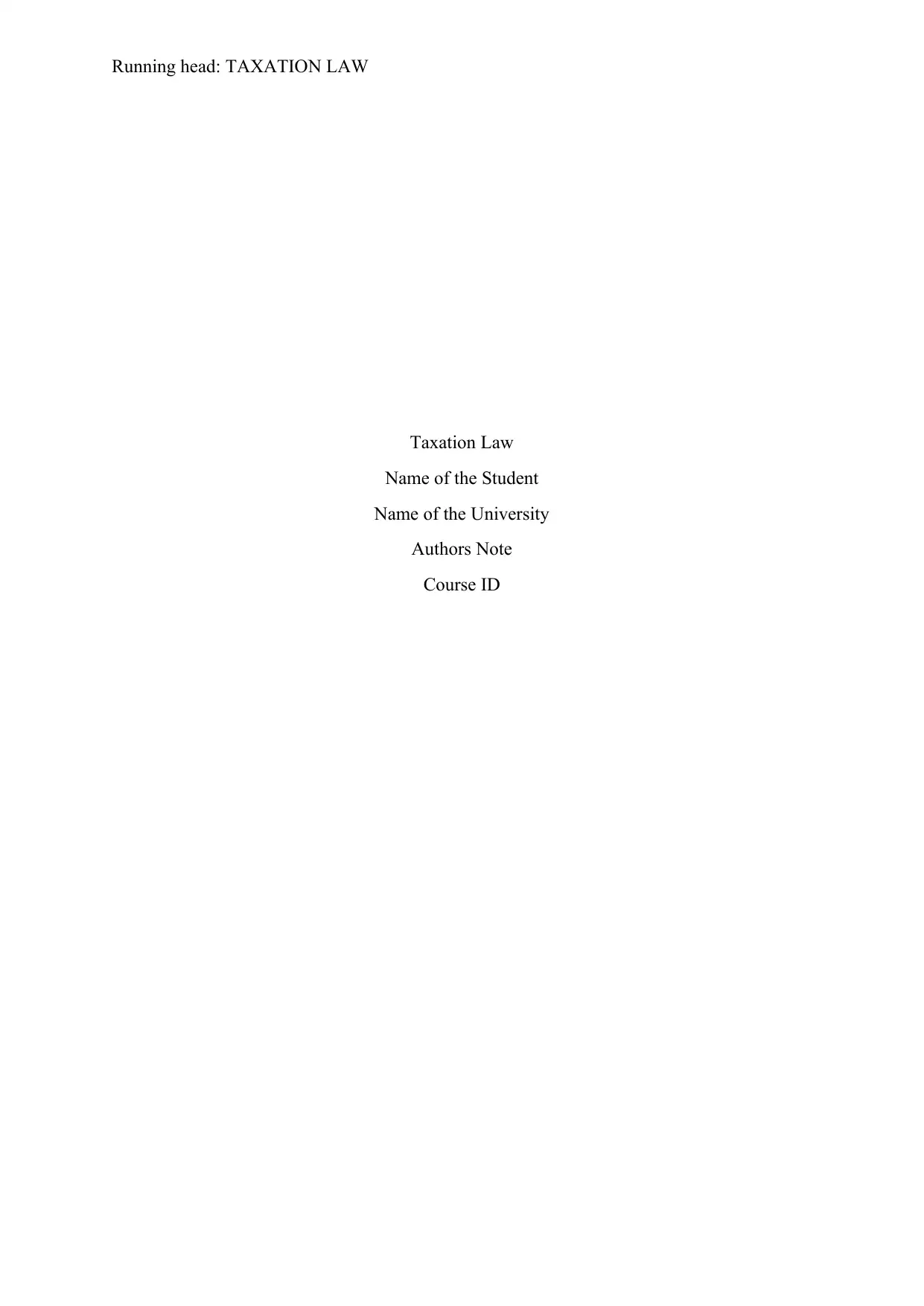
Running head: TAXATION LAW
Taxation Law
Name of the Student
Name of the University
Authors Note
Course ID
Taxation Law
Name of the Student
Name of the University
Authors Note
Course ID
Paraphrase This Document
Need a fresh take? Get an instant paraphrase of this document with our AI Paraphraser
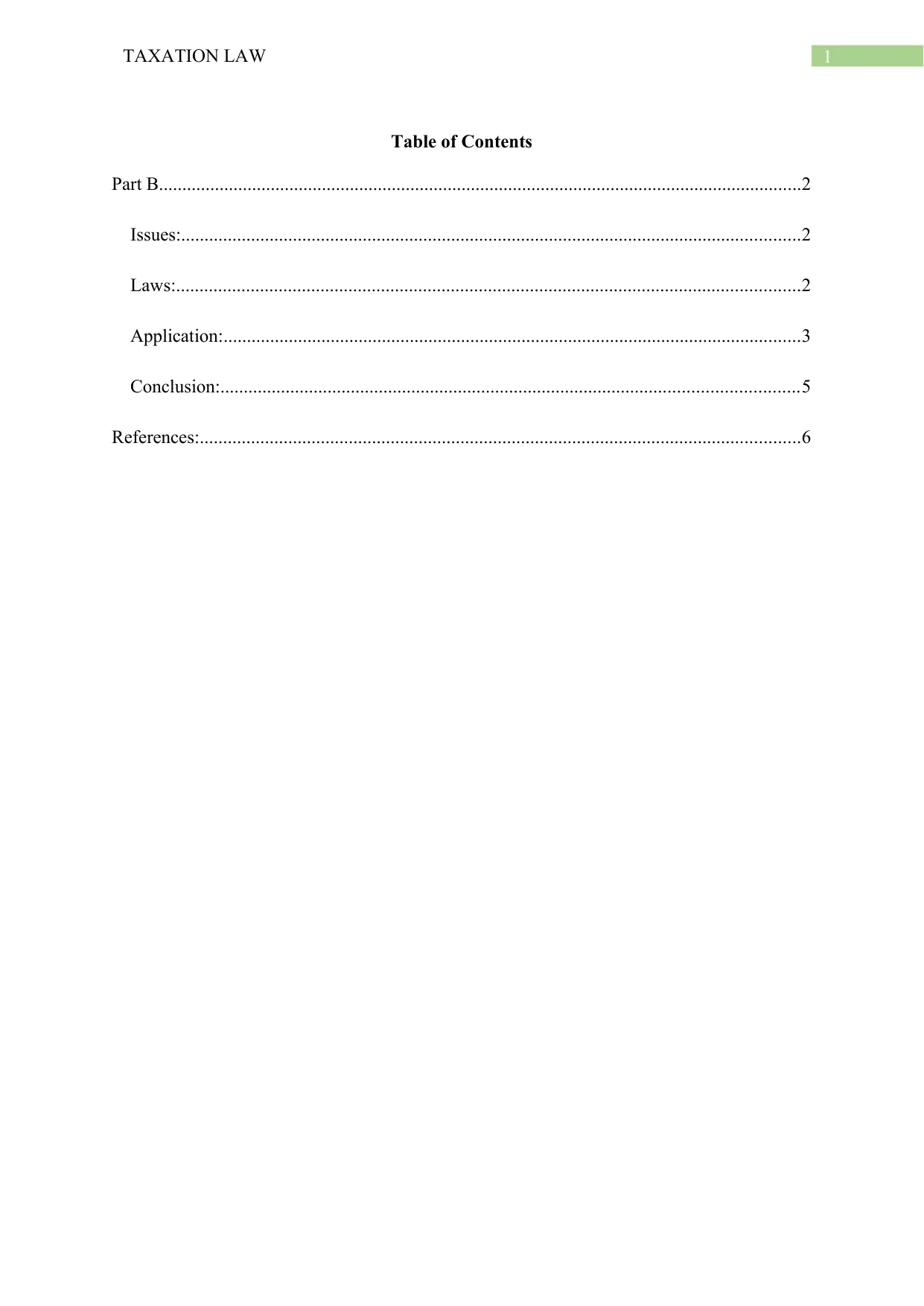
1TAXATION LAW
Table of Contents
Part B..........................................................................................................................................2
Issues:.....................................................................................................................................2
Laws:......................................................................................................................................2
Application:............................................................................................................................3
Conclusion:............................................................................................................................5
References:.................................................................................................................................6
Table of Contents
Part B..........................................................................................................................................2
Issues:.....................................................................................................................................2
Laws:......................................................................................................................................2
Application:............................................................................................................................3
Conclusion:............................................................................................................................5
References:.................................................................................................................................6
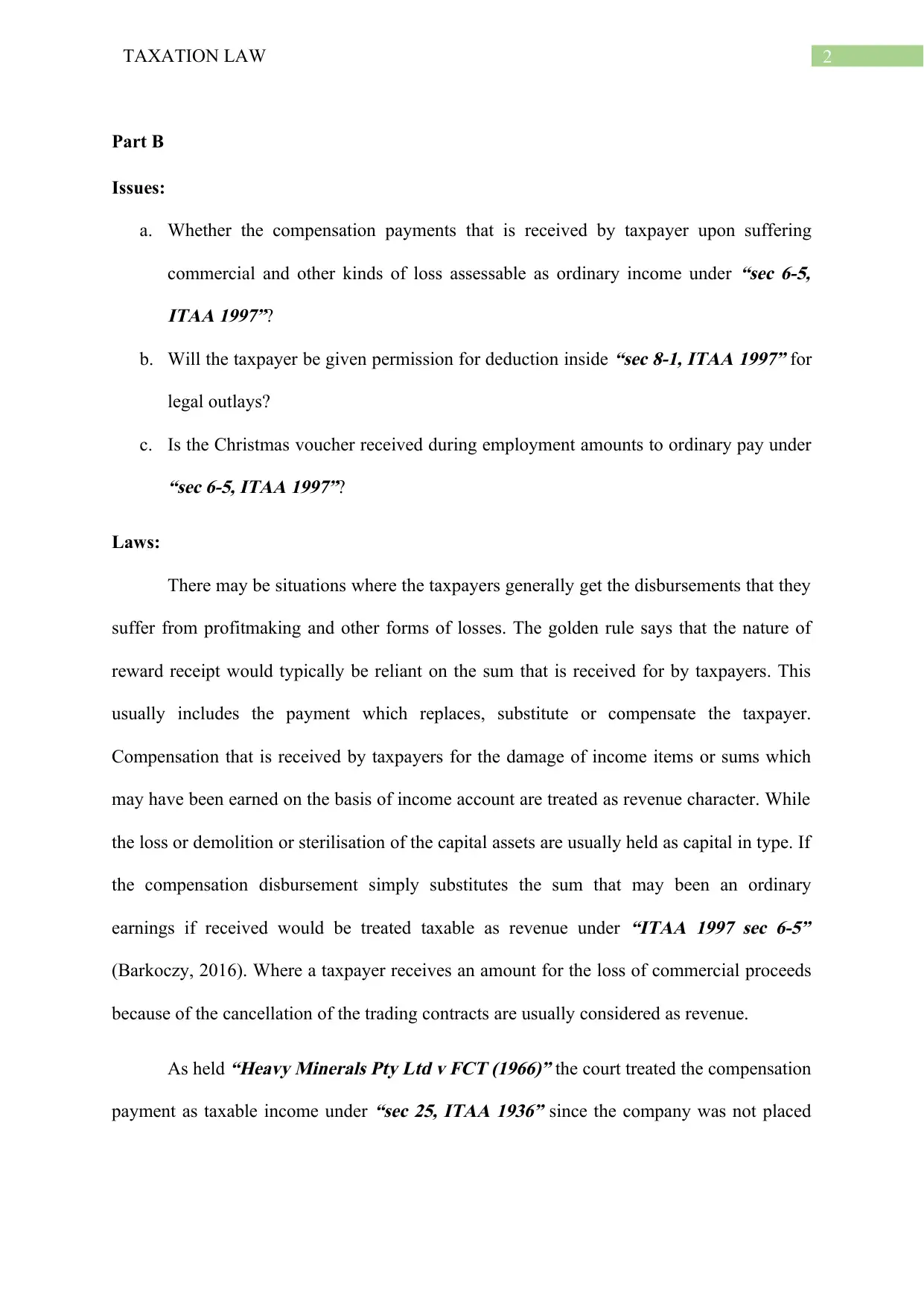
2TAXATION LAW
Part B
Issues:
a. Whether the compensation payments that is received by taxpayer upon suffering
commercial and other kinds of loss assessable as ordinary income under
“sec 6-5,
ITAA 1997”?
b. Will the taxpayer be given permission for deduction inside
“sec 8-1, ITAA 1997” for
legal outlays?
c. Is the Christmas voucher received during employment amounts to ordinary pay under“sec 6-5, ITAA 1997”?
Laws:
There may be situations where the taxpayers generally get the disbursements that they
suffer from profitmaking and other forms of losses. The golden rule says that the nature of
reward receipt would typically be reliant on the sum that is received for by taxpayers. This
usually includes the payment which replaces, substitute or compensate the taxpayer.
Compensation that is received by taxpayers for the damage of income items or sums which
may have been earned on the basis of income account are treated as revenue character. While
the loss or demolition or sterilisation of the capital assets are usually held as capital in type. If
the compensation disbursement simply substitutes the sum that may been an ordinary
earnings if received would be treated taxable as revenue under
“ITAA 1997 sec 6-5”
(Barkoczy, 2016). Where a taxpayer receives an amount for the loss of commercial proceeds
because of the cancellation of the trading contracts are usually considered as revenue.
As held
“Heavy Minerals Pty Ltd v FCT (1966)” the court treated the compensation
payment as taxable income under
“sec 25, ITAA 1936” since the company was not placed
Part B
Issues:
a. Whether the compensation payments that is received by taxpayer upon suffering
commercial and other kinds of loss assessable as ordinary income under
“sec 6-5,
ITAA 1997”?
b. Will the taxpayer be given permission for deduction inside
“sec 8-1, ITAA 1997” for
legal outlays?
c. Is the Christmas voucher received during employment amounts to ordinary pay under“sec 6-5, ITAA 1997”?
Laws:
There may be situations where the taxpayers generally get the disbursements that they
suffer from profitmaking and other forms of losses. The golden rule says that the nature of
reward receipt would typically be reliant on the sum that is received for by taxpayers. This
usually includes the payment which replaces, substitute or compensate the taxpayer.
Compensation that is received by taxpayers for the damage of income items or sums which
may have been earned on the basis of income account are treated as revenue character. While
the loss or demolition or sterilisation of the capital assets are usually held as capital in type. If
the compensation disbursement simply substitutes the sum that may been an ordinary
earnings if received would be treated taxable as revenue under
“ITAA 1997 sec 6-5”
(Barkoczy, 2016). Where a taxpayer receives an amount for the loss of commercial proceeds
because of the cancellation of the trading contracts are usually considered as revenue.
As held
“Heavy Minerals Pty Ltd v FCT (1966)” the court treated the compensation
payment as taxable income under
“sec 25, ITAA 1936” since the company was not placed
⊘ This is a preview!⊘
Do you want full access?
Subscribe today to unlock all pages.

Trusted by 1+ million students worldwide
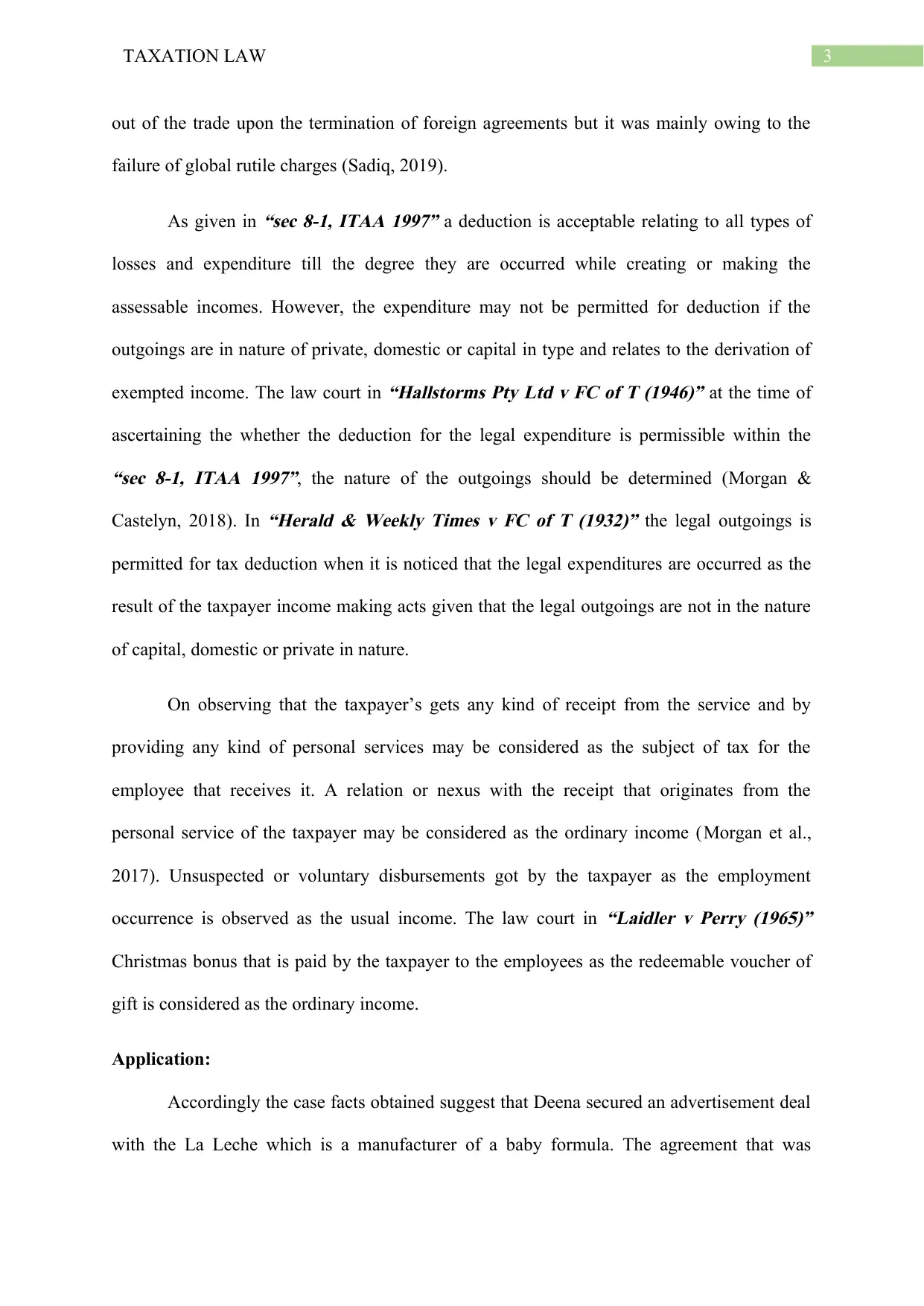
3TAXATION LAW
out of the trade upon the termination of foreign agreements but it was mainly owing to the
failure of global rutile charges (Sadiq, 2019).
As given in
“sec 8-1, ITAA 1997” a deduction is acceptable relating to all types of
losses and expenditure till the degree they are occurred while creating or making the
assessable incomes. However, the expenditure may not be permitted for deduction if the
outgoings are in nature of private, domestic or capital in type and relates to the derivation of
exempted income. The law court in
“Hallstorms Pty Ltd v FC of T (1946)” at the time of
ascertaining the whether the deduction for the legal expenditure is permissible within the
“sec 8-1, ITAA 1997”, the nature of the outgoings should be determined (Morgan &
Castelyn, 2018). In
“Herald & Weekly Times v FC of T (1932)” the legal outgoings is
permitted for tax deduction when it is noticed that the legal expenditures are occurred as the
result of the taxpayer income making acts given that the legal outgoings are not in the nature
of capital, domestic or private in nature.
On observing that the taxpayer’s gets any kind of receipt from the service and by
providing any kind of personal services may be considered as the subject of tax for the
employee that receives it. A relation or nexus with the receipt that originates from the
personal service of the taxpayer may be considered as the ordinary income (Morgan et al.,
2017). Unsuspected or voluntary disbursements got by the taxpayer as the employment
occurrence is observed as the usual income. The law court in
“Laidler v Perry (1965)”
Christmas bonus that is paid by the taxpayer to the employees as the redeemable voucher of
gift is considered as the ordinary income.
Application:
Accordingly the case facts obtained suggest that Deena secured an advertisement deal
with the La Leche which is a manufacturer of a baby formula. The agreement that was
out of the trade upon the termination of foreign agreements but it was mainly owing to the
failure of global rutile charges (Sadiq, 2019).
As given in
“sec 8-1, ITAA 1997” a deduction is acceptable relating to all types of
losses and expenditure till the degree they are occurred while creating or making the
assessable incomes. However, the expenditure may not be permitted for deduction if the
outgoings are in nature of private, domestic or capital in type and relates to the derivation of
exempted income. The law court in
“Hallstorms Pty Ltd v FC of T (1946)” at the time of
ascertaining the whether the deduction for the legal expenditure is permissible within the
“sec 8-1, ITAA 1997”, the nature of the outgoings should be determined (Morgan &
Castelyn, 2018). In
“Herald & Weekly Times v FC of T (1932)” the legal outgoings is
permitted for tax deduction when it is noticed that the legal expenditures are occurred as the
result of the taxpayer income making acts given that the legal outgoings are not in the nature
of capital, domestic or private in nature.
On observing that the taxpayer’s gets any kind of receipt from the service and by
providing any kind of personal services may be considered as the subject of tax for the
employee that receives it. A relation or nexus with the receipt that originates from the
personal service of the taxpayer may be considered as the ordinary income (Morgan et al.,
2017). Unsuspected or voluntary disbursements got by the taxpayer as the employment
occurrence is observed as the usual income. The law court in
“Laidler v Perry (1965)”
Christmas bonus that is paid by the taxpayer to the employees as the redeemable voucher of
gift is considered as the ordinary income.
Application:
Accordingly the case facts obtained suggest that Deena secured an advertisement deal
with the La Leche which is a manufacturer of a baby formula. The agreement that was
Paraphrase This Document
Need a fresh take? Get an instant paraphrase of this document with our AI Paraphraser
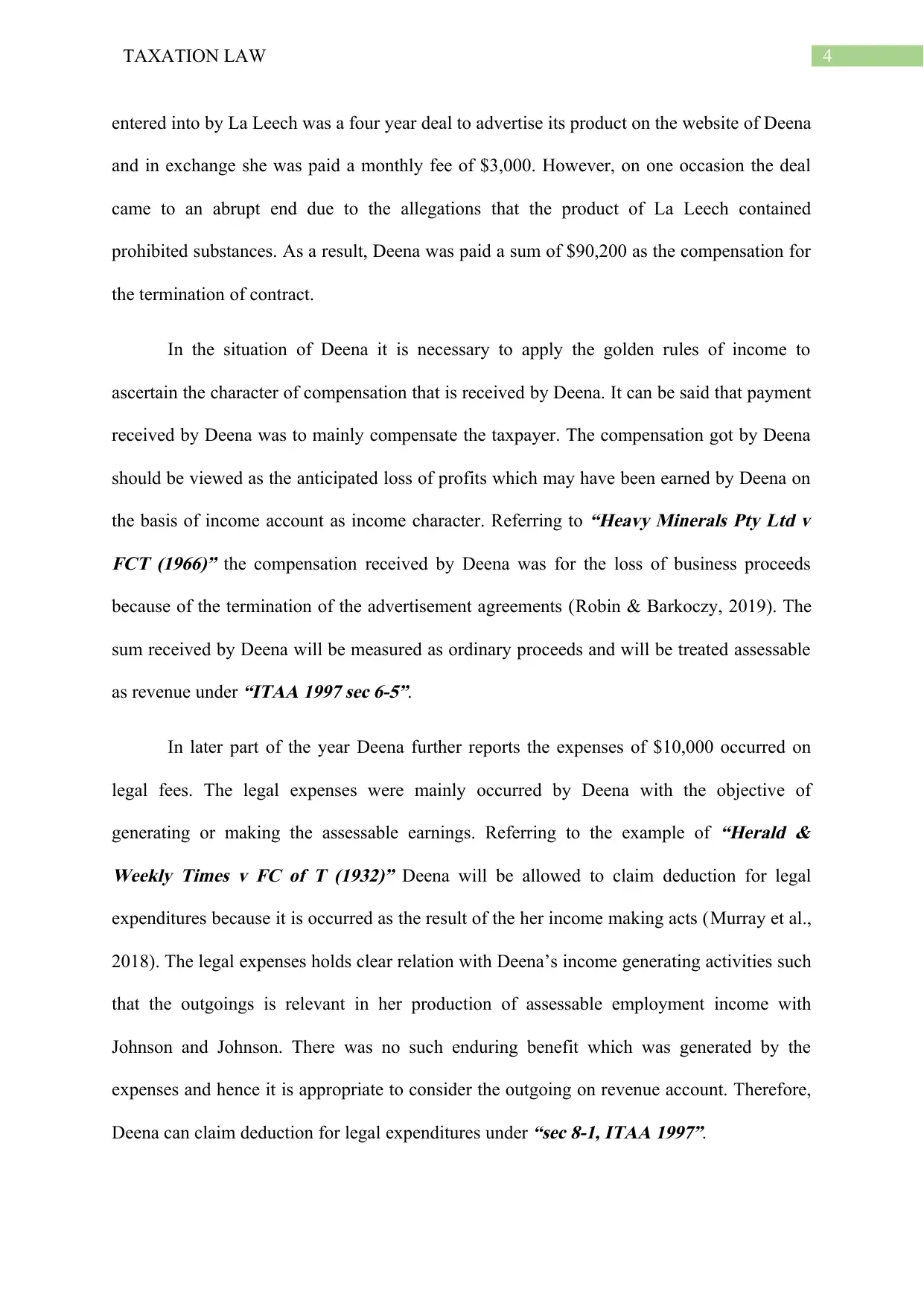
4TAXATION LAW
entered into by La Leech was a four year deal to advertise its product on the website of Deena
and in exchange she was paid a monthly fee of $3,000. However, on one occasion the deal
came to an abrupt end due to the allegations that the product of La Leech contained
prohibited substances. As a result, Deena was paid a sum of $90,200 as the compensation for
the termination of contract.
In the situation of Deena it is necessary to apply the golden rules of income to
ascertain the character of compensation that is received by Deena. It can be said that payment
received by Deena was to mainly compensate the taxpayer. The compensation got by Deena
should be viewed as the anticipated loss of profits which may have been earned by Deena on
the basis of income account as income character. Referring to
“Heavy Minerals Pty Ltd v
FCT (1966)” the compensation received by Deena was for the loss of business proceeds
because of the termination of the advertisement agreements (Robin & Barkoczy, 2019). The
sum received by Deena will be measured as ordinary proceeds and will be treated assessable
as revenue under
“ITAA 1997 sec 6-5”.
In later part of the year Deena further reports the expenses of $10,000 occurred on
legal fees. The legal expenses were mainly occurred by Deena with the objective of
generating or making the assessable earnings. Referring to the example of
“Herald &
Weekly Times v FC of T (1932)” Deena will be allowed to claim deduction for legal
expenditures because it is occurred as the result of the her income making acts (Murray et al.,
2018). The legal expenses holds clear relation with Deena’s income generating activities such
that the outgoings is relevant in her production of assessable employment income with
Johnson and Johnson. There was no such enduring benefit which was generated by the
expenses and hence it is appropriate to consider the outgoing on revenue account. Therefore,
Deena can claim deduction for legal expenditures under
“sec 8-1, ITAA 1997”.
entered into by La Leech was a four year deal to advertise its product on the website of Deena
and in exchange she was paid a monthly fee of $3,000. However, on one occasion the deal
came to an abrupt end due to the allegations that the product of La Leech contained
prohibited substances. As a result, Deena was paid a sum of $90,200 as the compensation for
the termination of contract.
In the situation of Deena it is necessary to apply the golden rules of income to
ascertain the character of compensation that is received by Deena. It can be said that payment
received by Deena was to mainly compensate the taxpayer. The compensation got by Deena
should be viewed as the anticipated loss of profits which may have been earned by Deena on
the basis of income account as income character. Referring to
“Heavy Minerals Pty Ltd v
FCT (1966)” the compensation received by Deena was for the loss of business proceeds
because of the termination of the advertisement agreements (Robin & Barkoczy, 2019). The
sum received by Deena will be measured as ordinary proceeds and will be treated assessable
as revenue under
“ITAA 1997 sec 6-5”.
In later part of the year Deena further reports the expenses of $10,000 occurred on
legal fees. The legal expenses were mainly occurred by Deena with the objective of
generating or making the assessable earnings. Referring to the example of
“Herald &
Weekly Times v FC of T (1932)” Deena will be allowed to claim deduction for legal
expenditures because it is occurred as the result of the her income making acts (Murray et al.,
2018). The legal expenses holds clear relation with Deena’s income generating activities such
that the outgoings is relevant in her production of assessable employment income with
Johnson and Johnson. There was no such enduring benefit which was generated by the
expenses and hence it is appropriate to consider the outgoing on revenue account. Therefore,
Deena can claim deduction for legal expenditures under
“sec 8-1, ITAA 1997”.
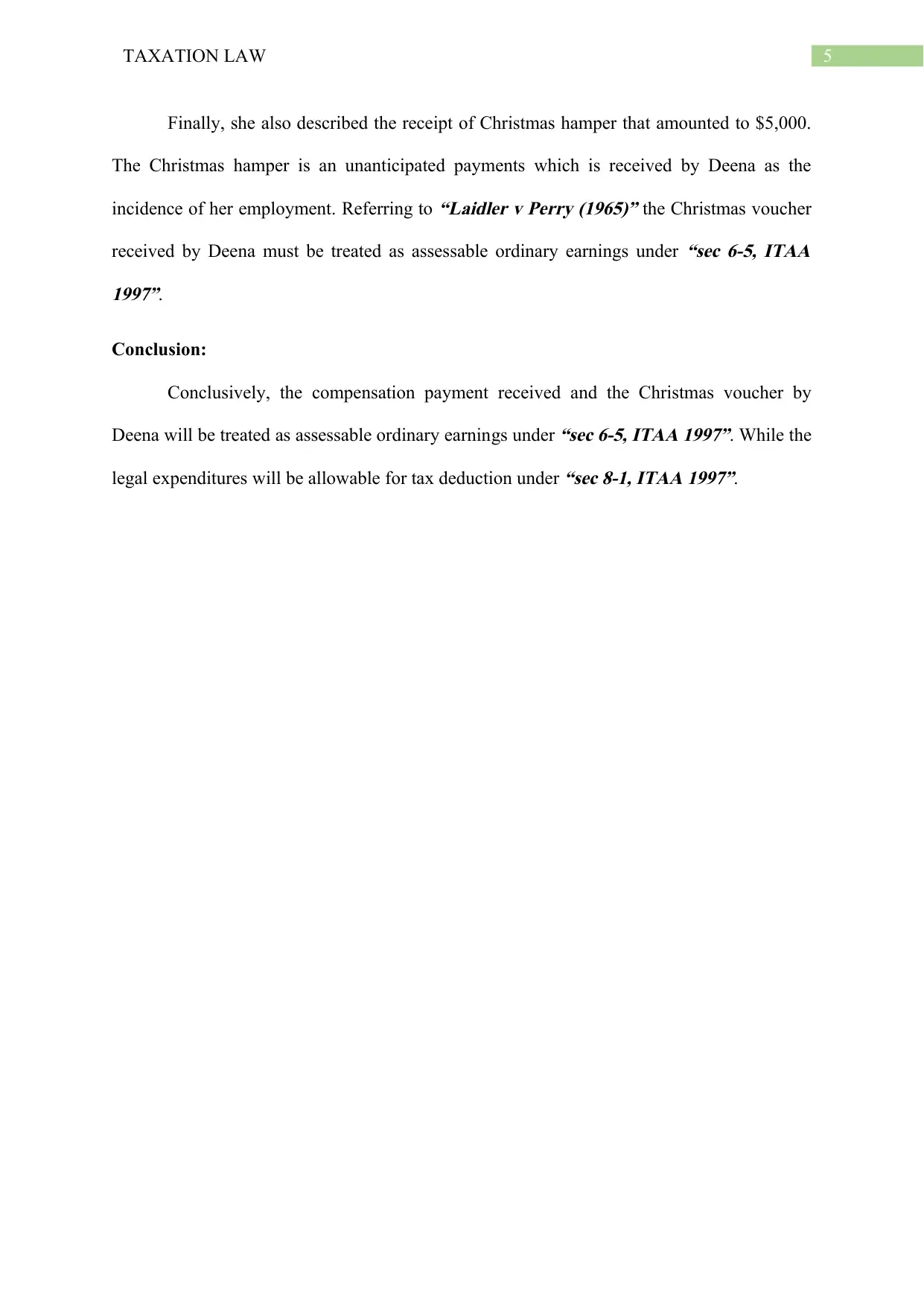
5TAXATION LAW
Finally, she also described the receipt of Christmas hamper that amounted to $5,000.
The Christmas hamper is an unanticipated payments which is received by Deena as the
incidence of her employment. Referring to
“Laidler v Perry (1965)” the Christmas voucher
received by Deena must be treated as assessable ordinary earnings under
“sec 6-5, ITAA
1997”.
Conclusion:
Conclusively, the compensation payment received and the Christmas voucher by
Deena will be treated as assessable ordinary earnings under
“sec 6-5, ITAA 1997”. While the
legal expenditures will be allowable for tax deduction under
“sec 8-1, ITAA 1997”.
Finally, she also described the receipt of Christmas hamper that amounted to $5,000.
The Christmas hamper is an unanticipated payments which is received by Deena as the
incidence of her employment. Referring to
“Laidler v Perry (1965)” the Christmas voucher
received by Deena must be treated as assessable ordinary earnings under
“sec 6-5, ITAA
1997”.
Conclusion:
Conclusively, the compensation payment received and the Christmas voucher by
Deena will be treated as assessable ordinary earnings under
“sec 6-5, ITAA 1997”. While the
legal expenditures will be allowable for tax deduction under
“sec 8-1, ITAA 1997”.
⊘ This is a preview!⊘
Do you want full access?
Subscribe today to unlock all pages.

Trusted by 1+ million students worldwide
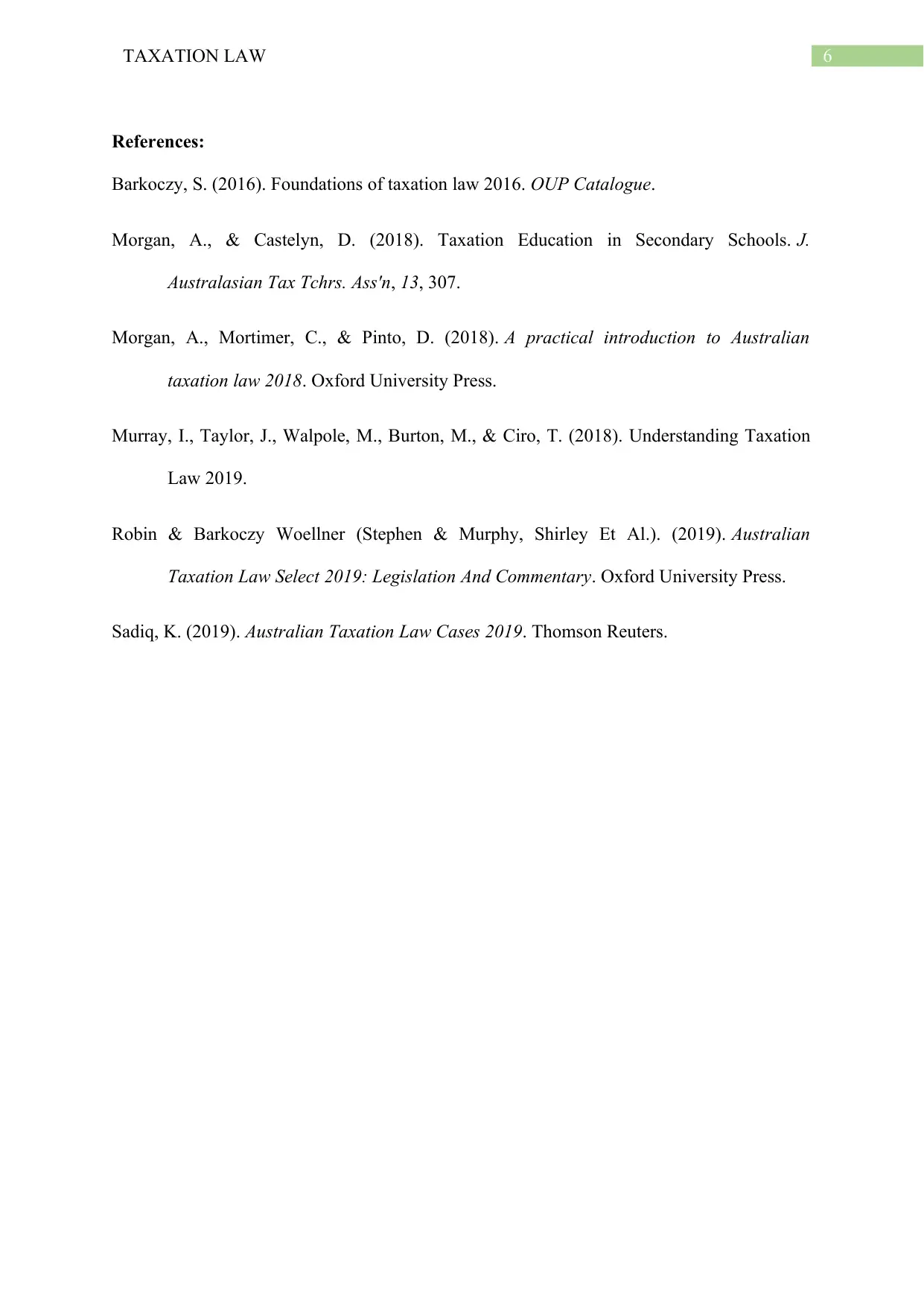
6TAXATION LAW
References:
Barkoczy, S. (2016). Foundations of taxation law 2016. OUP Catalogue.
Morgan, A., & Castelyn, D. (2018). Taxation Education in Secondary Schools. J.
Australasian Tax Tchrs. Ass'n, 13, 307.
Morgan, A., Mortimer, C., & Pinto, D. (2018). A practical introduction to Australian
taxation law 2018. Oxford University Press.
Murray, I., Taylor, J., Walpole, M., Burton, M., & Ciro, T. (2018). Understanding Taxation
Law 2019.
Robin & Barkoczy Woellner (Stephen & Murphy, Shirley Et Al.). (2019). Australian
Taxation Law Select 2019: Legislation And Commentary. Oxford University Press.
Sadiq, K. (2019). Australian Taxation Law Cases 2019. Thomson Reuters.
References:
Barkoczy, S. (2016). Foundations of taxation law 2016. OUP Catalogue.
Morgan, A., & Castelyn, D. (2018). Taxation Education in Secondary Schools. J.
Australasian Tax Tchrs. Ass'n, 13, 307.
Morgan, A., Mortimer, C., & Pinto, D. (2018). A practical introduction to Australian
taxation law 2018. Oxford University Press.
Murray, I., Taylor, J., Walpole, M., Burton, M., & Ciro, T. (2018). Understanding Taxation
Law 2019.
Robin & Barkoczy Woellner (Stephen & Murphy, Shirley Et Al.). (2019). Australian
Taxation Law Select 2019: Legislation And Commentary. Oxford University Press.
Sadiq, K. (2019). Australian Taxation Law Cases 2019. Thomson Reuters.
1 out of 7
Related Documents
Your All-in-One AI-Powered Toolkit for Academic Success.
+13062052269
info@desklib.com
Available 24*7 on WhatsApp / Email
![[object Object]](/_next/static/media/star-bottom.7253800d.svg)
Unlock your academic potential
Copyright © 2020–2025 A2Z Services. All Rights Reserved. Developed and managed by ZUCOL.




